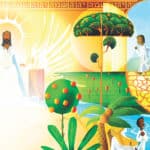Today?s guest post was written by James A. De Jong,?retired president of Calvin Theological Seminary.?He is widely published in the history of Reformed theology and history of missions. He has taught on the undergraduate and graduate levels and has lectured globally.
Ben Myers? new book The Apostles? Creed: A Guide to the Ancient Catechism is exactly the genre and quality of material that will grip searching young people. I wish Dylan had had it, although his will and capacity to search any longer had pretty well shriveled.
Six weeks after I read the book and just days before writing this, Dylan took his own life. He was only nineteen, the grandchild of a close relative. He never really had a chance! Raised in a twice-broken home with all the stress and absence of stability and norms that that usually entails, he was drowning in turbulence. Acting out, he bounced in and out of therapies and institutions, had brushes with law enforcement, and ended in a relationship with a young woman as confused and angry as he. He had no sense of worth. No hope. No purpose in life. No recognized prospect of deliverance. All this negation existed despite a loving Christian grandmother?s repeated interventions, rescue attempts, support, and love.
So Dylan became another teen suicide, the leading and expanding cause of death among young people in our affluent, materialistic society. These youth have so much, but so little.
The problem is, of course, that you can?t simply give a young person like Dylan a book. Not even a good one. Not even a compelling one, like Ben Myers?. Not always, but usually, they have to be recommended or given with sensitive timing and swaddled with credible concern and affirmation. Fine books like this are sharp tools. Adroitly manipulated in the hands of a skillful Christian friend, parent, pastor, teacher, or counsellor, they can excise what?s festering spiritually. They can scrape and scour out spiritual poison. Then healthy insights and examples and convictions can be sutured in by the Great Physician to foster healthy, new life. Faith life.
For millennials and other young people what are important are meaning and purpose and authenticity. These have to be reliable and durable. They also have to be compelling and winsome. Pretenses, prestige, acclaim, institutional obligations, personal achievement or power or notoriety do not impress them. Nor do theological intricacies and battles or denominational constraints. These belong to an age in eclipse. Give these folk solid Christian basics on which to build their lives and families and you?ve got their attention and will win their loyalty. They belong to the era of unvarnished truth.
My sense is that the Ben Myers? book is their kind of material.
A major reason for saying so is that it features patristic authorities. What?s important about leading Christian thinkers from the second through seventh centuries is that they burnished the basic Christian convictions as they were emerging. This gives them credibility. Their legacy also hurdles over all that was divisive and secondary in the intervening centuries between their day and ours. Myers highlights, then, what has endured. The substance he offers is solid. It was forged in the fires of suffering, often martyrdom. This fosters admiration for the creed?s content. It enhances its value because it has been bought at a high price. Leaders in both the Eastern and Western traditions contributed to this distillation of the apostolic faith. And the legacy they have left us in this document has shaped Christian believing in both sides of the church and in all the subsequent variants each has produced. This is all high commendation for a thoughtful young person searching for truth that stands the test of time.
Myers cites a dozen or so patristic fathers as well as several medieval and recent Christian thinkers. He harvests their biblical insights and adds his own. The book?s scriptural richness enhances its appeal for inquiring young readers.





